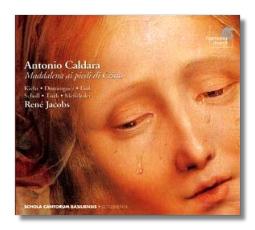
The Internet's Premier Classical Music Source
Related Links
- Latest Reviews
- More Reviews
-
By Composer
-
Collections
DVD & Blu-ray
Books
Concert Reviews
Articles/Interviews
Software
Audio
Search Amazon
Recommended Links
Site News
 CD Review
CD Review
Antonio Caldara

Maddalena ai piedi di Cristo
Cast
- Maddalena - Maria Cristina Kiehr (soprano)
- Marta - Rosa Dominguez (soprano)
- Earthly Love - Bernardo Fink (mezzo)
- Celestial Love - Andreas Scholl (counter-tenor)
- Pharisee - Ulrich Messthaler (bass)
- Christ - Gerd Türk (tenor)
Orchestra of the Schola Cantorum Basiliensis/René Jacobs
Recorded January 1995
Harmonia Mundi 905221/22 2CDs
Reissued as HMA1905221/22
Amazon
- UK
- Germany
- Canada
- France
- Japan
- ArkivMusic
- CD Universe
- Maddalena - Maria Cristina Kiehr (soprano)
- Marta - Rosa Dominguez (soprano)
- Earthly Love - Bernardo Fink (mezzo)
- Celestial Love - Andreas Scholl (counter-tenor)
- Pharisee - Ulrich Messthaler (bass)
- Christ - Gerd Türk (tenor)
Recorded January 1995
Harmonia Mundi 905221/22 2CDs
Amazon - UK - Germany - Canada - France - Japan - ArkivMusic - CD Universe
The oratorio as a musical form emerged toward the end of the seventeenth century as a kind of "spiritual exercise" encouraged by the Congregazione dell'Oratorio in Rome. The performances took place in oratories (prayer halls) constructed above church naves and were intended to be attractive but edifying entertainments. Then as later, oratorios generally reflected the popular forms and styles of secular music – and in late Renaissance and Baroque Italy, this meant opera, though based on religious rather than mythological and heroic themes. The most prolific composer in this genre was Antonio Caldara (c1670-1736); New Grove lists 43 oratorios (in addition to many operas) and there are probably more that have been lost, written for patrons in his native Venice, Rome, Florence, Mantua, and Vienna.
Maddalena ai piedi di Cristo (Magdalene at the Feet of Christ) was probably written around 1700 in Rome. The tight and cohesive libretto by Lodovici Forni (also used by Bononcini in 1690) is based on Luke 7:36-50, with the addition of Martha from John 11:1-2 and 12:1-4. For dramatic purposes, Forni introduced the figures of Celestial and Earthly Love (representing good and evil) in combat for the soul of Maddalena, whose irresolution and anguish – not reflected in the spare Biblical narrative – are movingly depicted.
The music is conventional for its time. All arias are in da capo form, some small-scale and intimate and scored for continuo only, others expanded and using larger orchestral forces, more flamboyant and operatic in nature. There are only three concerted arias, all duets for Earthly and Celestial Love, and relationships among the characters are explored only in the recitatives, with the arias reflecting a variety of moods and emotions. The instrumental writing is consistently imaginative and expressive, and many of the arias, especially those of Maddalena in the course of her renunciation of worldly pleasures in favor of Jesus, are full of feeling and exceptionally beautiful. Handel probably met Caldara in Rome, and may well have learned something from him; at any rate, the comparison is not at all in Caldara's disfavor.
René Jacobs is a specialist in baroque vocal music, and under his guidance the singers (mostly former students at his Schola Cantorum in Basel) and the instrumental group of that institution provide fluent, expressive, and idiomatic performances. Maria Cristina Kiehr has a lovely, clear voice and conveys Maddalena's emotions with much color and feeling. Bernarda Fink opens and closes the piece with force and beauty, and her final aria is a brilliant and hell-raising act of defiance; Rosa Dominguez is equally effective as Martha. I can even put up with counter-tenor Andreas Scholl, who does less hooting than most of his ilk, and Ulrich Messthaler and Gerd Türk are smooth and clear in the smaller roles of the Pharisee and Christ. The sound is excellent. This is unfamiliar music that is too beautiful to be neglected, and these discs are very welcome.
Copyright © 1998, Alexander J. Morin


















